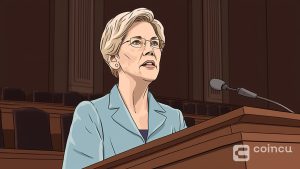After Severely Punishing Kraken, Will The SEC Attack BUSD Again?
According to people familiar with the matter, stablecoin issuer Paxos will face a lawsuit by the US Securities and Exchange Commission (SEC) over BUSD-related issues. US SEC enforcement officers have issued a “Wells notice” to Paxos, informing them of possible enforcement actions. The SEC stated that the BUSD issued and listed by Paxos is an unregistered security and plans to sue Paxos for violating investor protection laws and may take enforcement action.
The “Wells Notice” is an informal reminder issued by the US SEC to US-listed companies before civil litigation. Listed companies that have received the notice can communicate and negotiate with the SEC before receiving a formal lawsuit. John Reed Stark, former director of the US SEC’s Internet Enforcement Office, tweeted:
“In my 18 years at SEC enforcement division, I can’t recall a time when I sent a Wells Notice and an enforcement action did not follow. SEC’s crypto-sweep continues!”
Changpeng Zhao, the CEO of Binance, said in a tweet:
“Binance will continue to support BUSD for the foreseeable future. We do foresee users migrating to other stablecoins over time. And we will make product adjustments accordingly. eg, move away from using BUSD as the main pair for trading, etc.”
As previously reported, the New York State Department of Financial Services (NYDFS) is investigating Paxos, the issuer of PaxDollar (USDP) and Binance USD (BUSD) stablecoins, the scope of which is unclear. An NYDFS spokesman said the agency was unable to comment on ongoing investigations.
Unlike the SEC vs. Ripple case, which has lasted for several years, the token that is rumored to be identified as a security is different from XRP. Its price will not fluctuate a lot, but BUSD will be pegged to the US dollar.
This also made the market wonder why can stablecoins be recognized as securities?
The SEC has not yet taken formal action against Paxos, nor has it disclosed any documents. Let’s also speculate on the occurrences based on the available information.
Cryptocurrencies vs. securities in regulatory eyes
When it comes to “securities,” it is natural to start with a clear concept. The Securities Act of 1933 was the first federal law in the United States to regulate the offering and sale of securities. It was initially implemented by the Federal Trade Commission, and then the SEC was established. This act has also become the main basis for the SEC’s enforcement. The bill stipulates that, except for some exempt cases, any securities must be registered with the SEC.
In this law, the concept of securities is also clarified. The first paragraph of Article 2 of the Securities Law stipulates:
“The term ‘‘security’’ means any note, stock, treasury stock, security future, security-based swap, bond, debenture, evidence of indebtedness, certificate of interest or participation in any profit sharing agreement, collateral-trust certificate, reorganization certificate or subscription, transferable share, investment contract, voting-trust certificate, certificate of deposit for a security, fractional undivided interest in oil, gas, or other mineral rights, any put, call, straddle, option, or privilege on any security, certificate of deposit, or group or index of securities (including any interest therein or based on the value thereof), or any put, call, straddle, option, or privilege entered into on a national securities exchange relating to foreign currency, or, in general, any interest or instrument commonly known as a ‘‘security’’, or any certificate of interest or participation in, temporary or interim certificate for, receipt for, guarantee of, or warrant or right to subscribe to or purchase, any of the foregoing.”
Obviously, it is difficult for cryptocurrencies using emerging encryption technologies to be clearly classified as one of the above-mentioned multiple products.
However, many judicial disputes between SEC and encryption companies still appear.
Because the more flexible type of “investment contract” is included in the connotation of securities, many financial products that are not explicitly mentioned can be related to this concept. As for whether it can be defined as a security through this clause, the famous “Howey test” can be used as a criterion. Standards for investment contracts.
The Howey test: The SEC’s main weapon in punching crypto
In Florida in the last century, William Howey established W. J. Howey Company and Howey-in-the-Hills Service Company and developed a novel product through these two companies.
The W. J. Howey Company purchased a citrus orchard in Florida and divided the citrus orchard land into smaller parcels to sell to investors. He promised that investors could lease the land to Howey-in-the-Hills Service, and the company would operate and care for the citrus groves, and investors would be able to reap the benefits of the citrus groves without engaging in any agricultural production.
The SEC believes that this investment contract is a security, and Howey did not submit any registration statement to the SEC for this special land product, which has violated the securities law.
In 1946, the SEC sued the W. J. Howey Company. Ultimately, following a lengthy judicial process, the U.S. Supreme Court ruled that land sales and service contracts qualify as “investment contracts” under the securities laws, meaning that these contracts can be deemed securities. This is an important case in determining the general applicability of federal securities laws.
The case led to and spawned the concept of the Howey test, which is used to determine whether certain investment products should be considered securities. The SEC believes that an “investment contract” is an investment of funds in an ordinary business with the reasonable expectation of profiting from the efforts of others.
Specifically, the Howey test consists of four elements:
- Invest funds;
- In a common cause;
- Reasonable expectations for profits;
- Efforts from others.
And the Howey test applies to any contract, scheme, or transaction, whether or not it is characteristic of a security.
It is based on this that a large number of cryptocurrencies are involved in the category of “investment contracts” in securities, and a lengthy judicial dispute has occurred with the SEC. In the lengthy SEC v. Ripple case, the SEC defined XRP as a security based on this principle.
In July 2022, the SEC will recognize AMP, RLY, DDX, XYO, RGT, LCX, POWR, DFX, KROM as securities.
In November 2022, the New Hampshire Federal Court in the United States made a verdict identifying LBRY as a security based on the Howey test, and made a ruling in favor of the SEC in the SEC v. LBRY case.
How do stablecoins become securities?
However, unlike XRP and other cryptocurrencies previously targeted by the SEC, BUSD is a stablecoin whose price is anchored to the US dollar. Investors do not have income expectations when purchasing this “product.” The product barely passes any of the Howey tests, so how does it qualify as a security?
At present, the SEC has not taken any formal action against Paxos, nor has it disclosed any documents. Our guess is:
It must be clear that the Howey test is only a standard for judging the “investment contracts” category in securities law. In addition, financial securities that we are more familiar with, such as bonds, bills, and mortgage trust certificates, are included. in it.
Back to BUSD, the reserve report disclosed by Paxos in January 2023 shows that the BUSD reserve includes two product categories: U.S. Treasury bonds and U.S. Treasury reverse repurchase agreements (overnight maturity and over-collateralization).
This holding structure makes it more like a money market fund; that is, users of BUSD are indirectly holding bonds (a class of securities). We can speculate that this may be why the SEC has identified BUSD as a security.
However, although users who hold BUSD bought money market fund-like products, they did not benefit from it.
The big stick of SEC sanctions is ready to go, but its impact has not yet been reflected in the market (BUSD has not broken the anchor, and BNB has performed solidly in today’s overall downward market).
According to Nansen data, the current total market value of BUSD is $16 billion, ranking third among stablecoins. About 90% ($14.4 billion) of BUSD is held by Binance addresses. Among them, the net outflow of Binance in the past 7 days exceeded 81.4 million BUSD. In addition, an address in Jump Trading has net withdrawn 57.8 million BUSD from the trading platform in the past 7 days, and the address still holds 18.8 million BUSD.
DISCLAIMER: The Information on this website is provided as general market commentary and does not constitute investment advice. We encourage you to do your research before investing.
Join us to keep track of news: https://linktr.ee/coincu
Harold
Coincu News






















